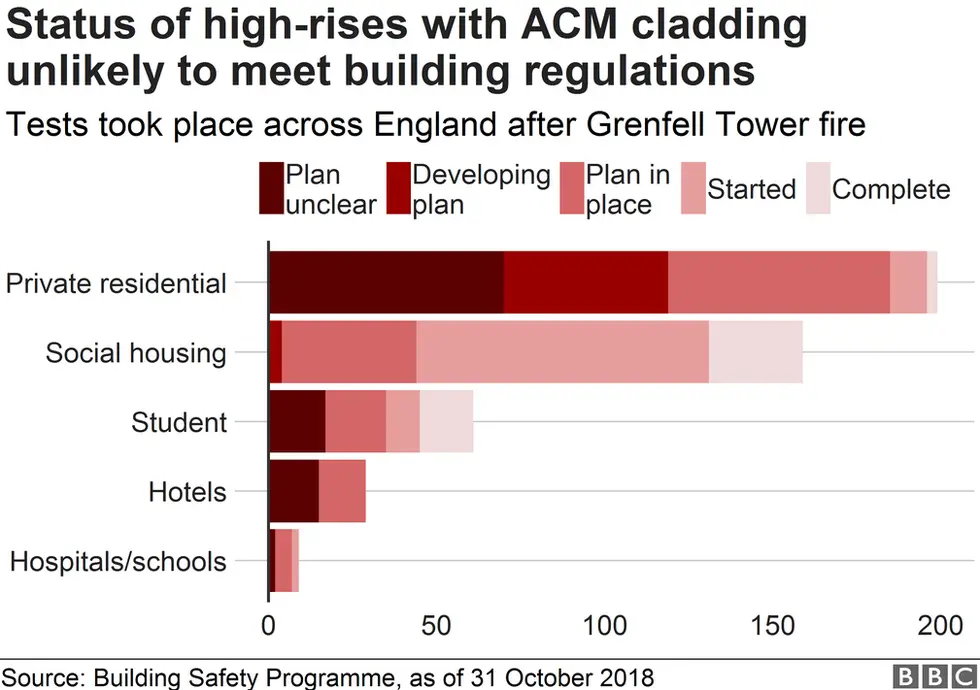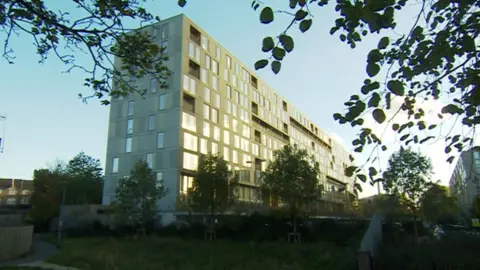Grenfell Tower: Unsafe cladding 'still affects thousands'
Thousands of people in England are still living in tower blocks with unsafe cladding more than a year after the Grenfell disaster.
More than 400 high-rise residential buildings still have the same type of external covering blamed for the rapid spread of the deadly blaze, official figures show.
BBC News found other buildings with different cladding also deemed unsafe.
The government said building owners should make their properties safe.
It ordered a review into cladding on high-rise blocks after the deaths of 72 people at Grenfell Tower in June 2017.
One of the tower blocks identified as still having Aluminium Composite Material (ACM) present in their structure is the 128-flat Skyline Apartments complex in Leeds city centre.
"We had a fire here in February 2018 and it was discovered that the building had cladding that is similar to Grenfell," said resident Nick Dugdale.
"We've known about this for months and it just feels like we're in a dark tunnel. I live on the 13th storey and I'm anxious about living here and I'm angry that this dangerous cladding hasn't been removed yet."
Liv Group, which manages Skyline, said it had since taken measures such as the introduction of fire wardens to make the building safer.
A spokesperson said resident safety was "of paramount importance and work has already started to remove the cladding".
In total, 419 residential buildings in 78 local authority areas across England have ACM cladding. This includes 61 student accommodation blocks.
ACM cladding is composed of a foam core between two aluminium sheets and is typically used to alter a building's external appearance.
Some types have been found to be highly flammable.

The total number of buildings in England with unsafe cladding is likely to be higher, as the government's figures only include blocks with defective ACM cladding.
BBC News has seen an assessment report of an award-winning tower block in Leeds called Saxton Parade.
The report states that the "structural insulated panels and high-pressure laminate cladding are all combustible" and, therefore, not compliant with previous or existing building regulations.
The 235-bed apartment block was redeveloped by Urban Splash, which said the building received all the necessary certificates upon its completion in 2011.

Warren Smart, who bought a property in Saxton Parade in 2016, said he now felt "trapped".
"When I found out that something was wrong with the cladding I thought is Grenfell going to happen here? It's really scary, you could be asleep and the whole place could go up."
Leaseholders at Saxton Parade have been told they might have to pay thousands of pounds for remedial work to be carried out to make the buildings safe.
"I haven't got the money to help pay for replacing the cladding. It's outrageous and ridiculous that they are even thinking about asking us to pay for cladding we knew nothing about," said Mr Smart.

A spokesman for Residential Management Group (RMG), the managing agent for Saxton Parade, said:
"The costs of the repair work will be met by the National House Building Council build warranty policy or from funds collected from the individual leaseholders. Our primary concern has been the continued safety of residents."
A recent legal judgement ruled that freeholders can charge leaseholders to pay for dangerous cladding to be removed from buildings.
Leeds Central MP Hilary Benn has now called on the government to change the law to protect leaseholders.
"It's unacceptable that people are still living in tower blocks that are unsafe, and now leaseholders are being asked for money they don't have, for a problem they're not responsible for" said Mr Benn.
James Brokenshire MP, Secretary of State for Housing, Communities and Local Government, said leaseholders should not have to pay for any cladding to be removed, but he would not commit to changing the law.
"It should be for those owning the buildings, and the developers that will actually have the responsibility of removing the cladding to pay for the changes, and it is important that they make sure that people are safe in their homes."
